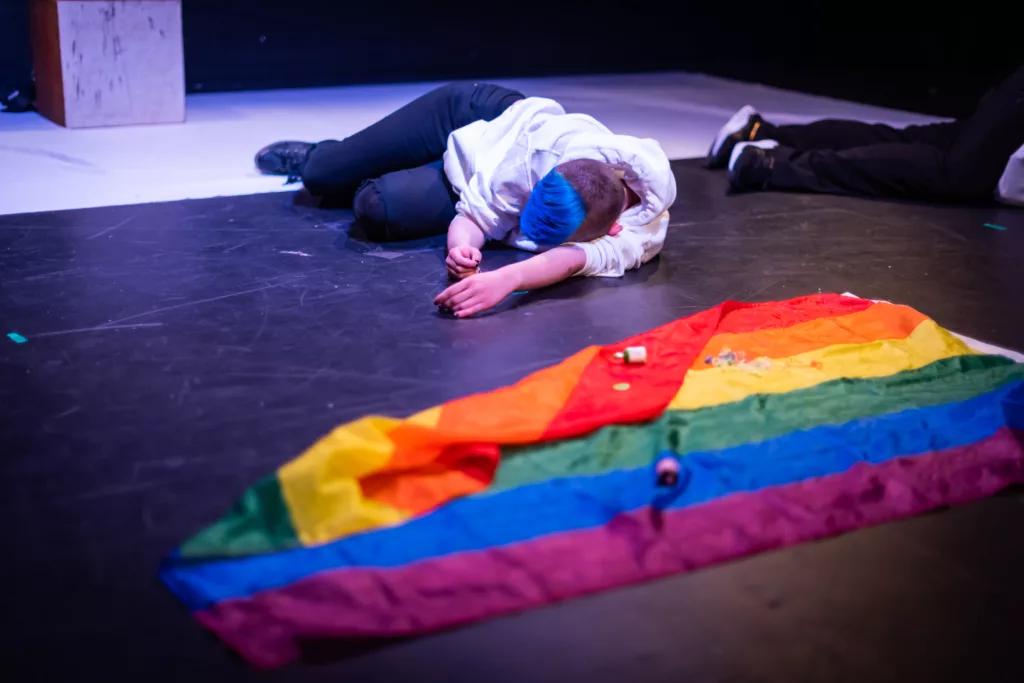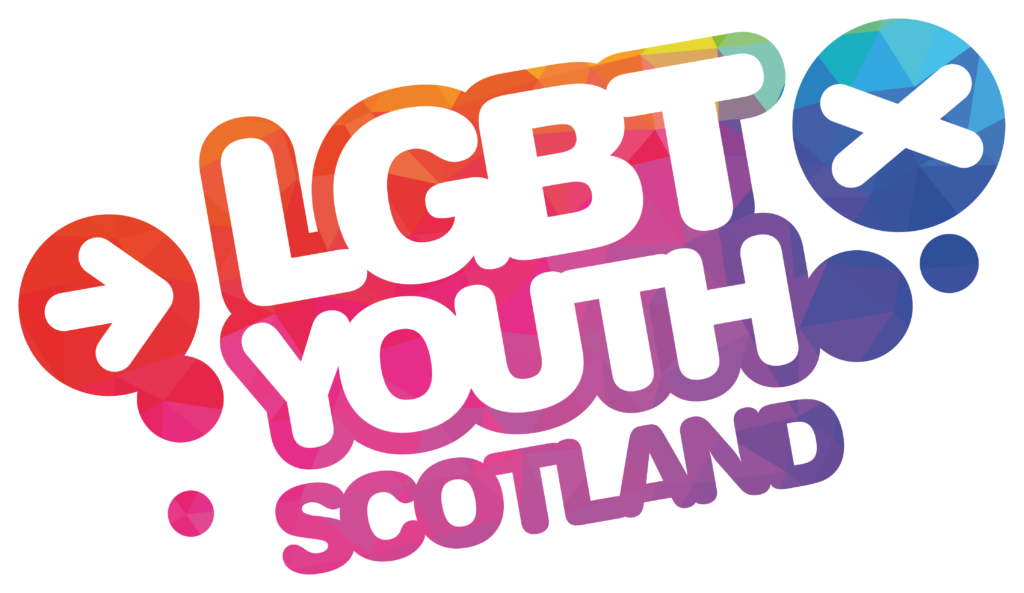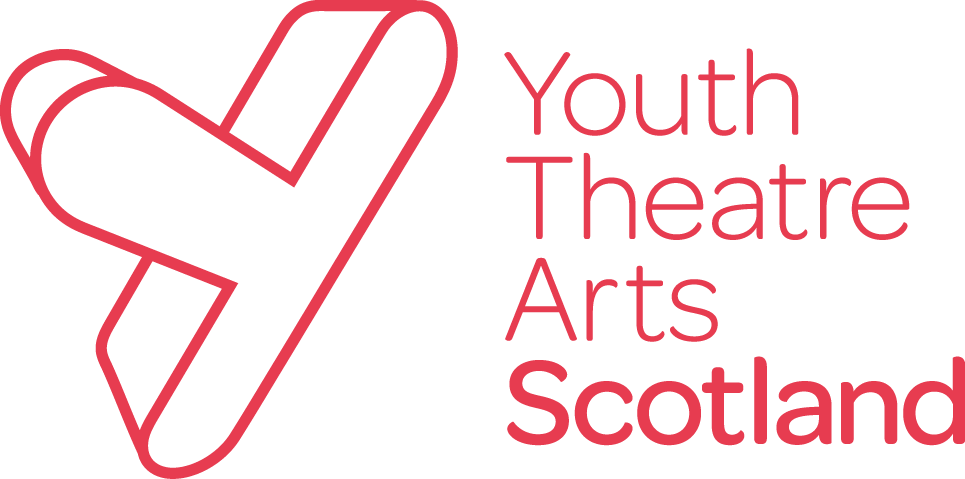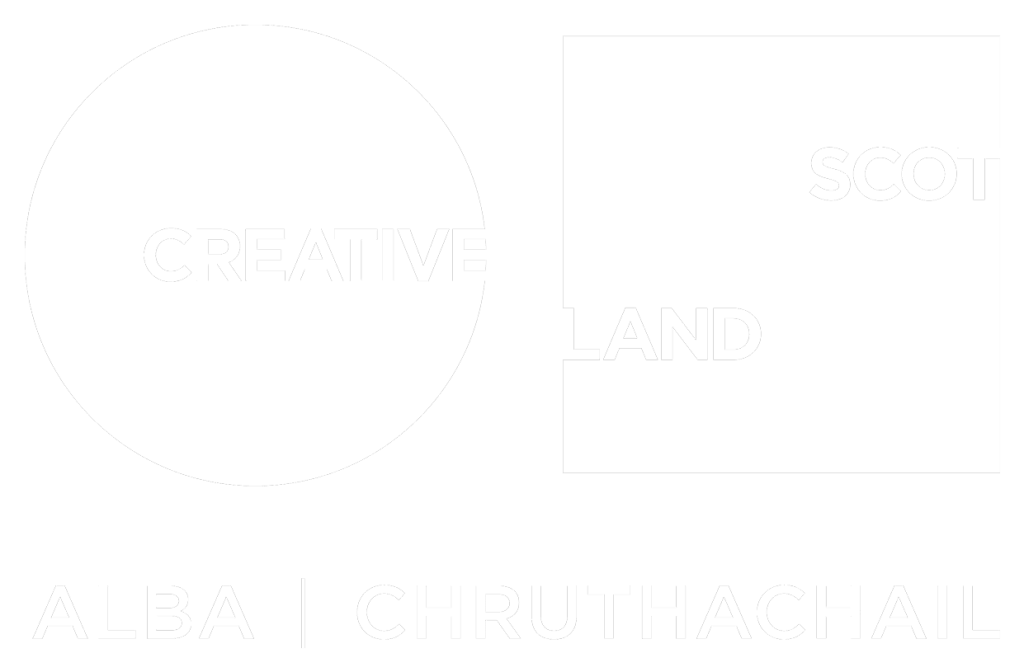If you’re looking for inspiration for performances or workshop sessions in February, how about helping to mark LGBT+ History Month with us? LGBT+ History Month is for everyone; whether you work in youth theatre, education, a cultural venue, a business, a service, are a member of a network/social group or an individual.
YTAS have pulled together some ideas of plays, musicals and monologues (below) that practitioners can use with their groups, to spark some ideas for ways to engage with LGBT+ History Month. However you use the suggestions is up to your own creative interpretation, from textual analysis to a group discussion, from a monologue session to a mini showcase, we’d love to know how you get on, or if you have any suggestions to add to our list.
What more can youth theatres do to support LGBTQIA+ young people?
YTAS is working towards a Silver Award in LGBT Youth Scotland’s Charter programme. This is a straightforward programme that enables organisations or schools to proactively include LGBTQIA+ people in every aspect of their work, protecting staff and providing a high-quality service to users. To find out how your youth theatre can begin its own Charter journey, be sure to reach out to LGBT Youth Scotland.
We’re also looking to build on our existing resources to help youth theatres in Scotland support their LGBTQIA+ young people. We’ve set up a drop-in working group, and over the next eight months we will meet to discuss practice, exchange ideas, and help YTAS to develop a toolkit for artists, practitioners and educators to utilise in their work with young people. The toolkit will consist of written and video resources, all of which we will attempt to cover within the working group calls. If you’re interested in getting involved in this work, please get in touch with emma@ytas.org.uk.
Queer Texts and Productions
LGBTQIA+ Stories
Happy Meal by Tabby Lamb (2022): A joyful trans romcom that follow two initial strangers connecting online over the course of several years; from teen to adult; from MySpace to TikTok; from cis to trans…
Beautiful Thing by Jonathan Harvey (1993): A heartfelt story about two working class boys on a London estate who fall in love. The play is a great example of a positive portrayal of queer characters with a focus on community, family and falling in love at 16.
Citizenship by Mark Ravenhill (2007): A bittersweet one-act comedy about growing up, following a boy’s frank and messy search to discover his sexual identity. It was developed as part of the National Theatre’s Connections programme and is noted as an ideal play for young performers.
Bloody Elle – A Gig Musical by Lauryn Redding (2021): This one-person gig musical, set to an original score, is a heart-warming and belly-achingly funny story about falling in love for the very first time, stuffed full of stomach-flipping, time-stopping moments.
Adam by Frances Poet (2017): This play follows the real-life story of Adam Kashmiry, a young trans man who travelled from Egypt to Scotland, crossing borders and crossing gender, in search of a place called home.
Wilf by James Ley (2023): This riotous and heartfelt new play from James Ley takes audiences on a hilarious and unapologetic ride through Scotland as Calvin and his rusty Volkswagen Polo named Wilf attempt to escape loneliness, cope with mental illness and learn to love themselves, with the help of one another. 18+
Edith Can Shoot Things and Hit Them by A. Rey Pamatmat (2011): Kenny, his sister Edith and their friend Benji play together on an abandoned farm in Middle America, with very little adult supervision. The play explores the dynamic between these three teenagers as Kenny and Benji begin to develop feelings for each other.
No I.D. by Tatenda Shamiso (2023): This biographical short play documents the bureaucratic barriers trans people often have to navigate when trying to legally change their gender. Shamiso explores this topic through humour, poetry, music and verbatim theatre.
First Time by Nathaniel J Hall (2019): This one-person show smashes through the stigma and shame of HIV, challenging the narrative of the Aids play by refusing to accept illness and death as the defining legacy of the HIV/Aids epidemic. Nathaniel’s second show Toxic will be published later this year.
Burgerz by Travis Alabanza (2018): When Travis had a burger thrown at them followed by a transphobic slur, they became obsessed with burgers. This is an empowering piece that explores how trans bodies survive and how, by them reclaiming an act of violence, we can address our own complicity.
Breeding by Barry McStay (2023): An intimate examination of the ethics around having children through the lens of a gay couple seeking to adopt a child.
The Laramie Projects by Moisés Kaufman (2000): This story follows the real-life incident of Matthew Shephard, a student at the University of Wyoming who was in killed in a homophobic attack in 1998. Through verbatim theatre, we hear reactions from the local community as well as the company’s own journal findings. 18+
Animal by Jon Bradfield (2023): From a story by Jon Bradfield and Josh Hepple, Animal is a hilarious and heartfelt portrayal of gay dating as a disabled person.
Bent by Martin Sherman (1979): Queer love blossoms in a Nazi concentration camp, a cornerstone of the queer play canon.
Black Superhero by Danny Lee Wynter (2023): This fantastical play is a depiction of black queer experiences as we follow David who finds himself falling for King, an up-and-coming star who’s famous for playing a leading cinematic superhero. 18+.
The Pride by Alexi Kaye Campbell (2008): Alternating between 1958 and 2008, The Pride examines changing attitudes to sexuality, looking at intimacy, identity and the courage it takes to be who you really are. 16+.
My Son’s a Queer (But What Can You Do?) by Rob Madge (2021): The joyous, chaotic, autobiographical story of actor, writer and social-media sensation Rob Madge. This production is about to have its Broadway premiere.
Dungeness by Chris Thompson (2020 NT Connections Anthology): In a remote part of the UK, where nothing ever happens, a group of teenagers share a safe house for LGBTQIA+ young people.
Cable Street by Lisa Goldman (2022 NT Connections Anthology): A love story between two young women, with the backdrop of the battle of Cable Street.
Strangers Like Me by Ed Harris (2023 NT Connections Anthology): A play about grief, masculinity, relationships and friendship.
Is This a Fairytale by Bea Webster (Positive Stories for Negative Times Season 1): A new play that rips apart the traditional fairy-tale canon and turns it on its head in a surprising, inventive and unconventional way. Explores gender and identity with ages 8+.
Write To Rave by Debris Stevenson (Positive Stories for Negative Times Season 2): A play about the political power of a rave. Who has the right to rave, to dance and move freely? What is it to feel truly free in your own skin? It tells the story a queer group of humans trying their best to rave whilst the world tries its best to stop them.
And the Rest of Me Floats by Outbox Theatre in association with Bush Theatre (2019): All about the messy business of gender. Performers from across the trans, non-binary, and queer communities weave together autobiographical performance, movement, pop songs, stand-up and dress-up in this anarchic celebration of gender expression and identity. A great text to use for exploring autobiographical work and devising.
Texts with LGBTQIA+ Characters
Variations by Katie Hims (2022 NT Connections Anthology): A play about family, string theory and breakfast. It is written with gendered roles but a very fluid text. Variations as written has an LGBTQIA+ character.
At First I Was Afraid by Douglas Maxwell (Positive Stories for Negative Times Season 2): A feel-good comedy drama about a girl who keeps a diary of all her anxieties; but as she moves from primary school to secondary, from normal life to lockdown, all of her worries appear to come true. At First I Was Afraid has a non-binary Fairygodcarer. Ages 11+.
Monologues and short texts
The Oberon Book of Queer Monologues: Chronicles over one hundred years of queer and trans performance. Combining stage plays with spoken word and performance art, this anthology features over forty extracts from some of the most exciting stage works in the English-speaking language.
Great LGBT Speeches: Empowering Voices that Engage and Inspire by Tea Uglow: A book of short speeches made by LGBTQIA+ people through history. A great resource to use as stimulus for devising, exploring verbatim and to learn about real events around the world.
Fluid Casting Opportunities
Love and Information by Caryl Churchill (2011): Churchill’s play does not explicitly explore LGBTQIA+ themes. However, each role can be played by actors of any gender. In a similarly fluid manner, the play is made up of short scenes/vignettes that can be played in any order.
Meet Me at Dawn by Zinnie Harris (2008): A couple find themselves stranded on an island after a boating accident. Dazed by their experience, they look for a path home but begin to analyse their relationship and their futures in the process. The play is a two-hander and does not require a set.
Stolen Secrets by Fin Kennedy (2015): From the heart of London’s East End, ‘stolen secrets’ are urban fairytales, bold, lyrical and gruesome, that can be performed individually or together for maximum shock value. It’s ideal for performance by schools and youth groups.
Buckets by Adam Barnard (2015): Across 33 interconnected scenes – some just a few lines, others mini-plays in their own right – buckets swings through a kaleidoscopic world of sadness and happiness, illness and health, youth and experience, kissing and crying, singing and dying. Barnard’s open-ended text can be performed by any number and composition of actors.
Innocent Creatures by Leo Butler (2023 NT Connections Anthology): A play about the future, both imminent and far, far away. The play has two female characters at its heart and can be portrayed as a love story. It also has a fluid structure to be adapted to any cast.
Revolting by Bryony Kimmings (Positive Stories for Negative Times Season 2): We are agents of the revolution. How do we revolt? How do we not get into trouble? Where do we get power, and then how do we use it for good? This play is about designing your own protest so could be framed around LGBTQIA+ issues.
Thanks For Nothing by the Pappy Show and Lewis Hetherington (Positive Stories for Negative Times Season 2): A process drama all about getting a group of diverse young people together and going on a process together. It’s about gratitude, happiness and celebrating difference
And The Name for That Is… by Robert Softley Gayle (Positive Stories for Negative Times Season 3): Meeting a date for a coffee is a whole lot of fun when you know even less about yourself than you do about your date! Prepare for ridiculous disability hi-jinx and a good measure of self-discovery. The show is about disability and dating.
Musicals with LGBTQIA+ characters or themes
Fun Home (2014): Based on Alison Bechdel’s graphic novel of the same name, this autobiographical musical traces Bechdel’s journey of self-discovery and queer identity at three key stages in her life. It’s moving, witty, wonderfully adapted and the songs are incredibly catchy!
A Strange Loop by Michael R. Jackson (2019): This meta-theatrical musical follows the story of Usher, a black queer man writing a musical about a black queer man writing a musical, all the while surrounded by his extremely obnoxious thoughts.
Rent by Jonathan Larson (1994): Often referred to as a ‘rock opera’, Rent follows a group of bohemian artists living in late 1980s New York, as they struggle to survive, develop their artistry and work at supporting each other under the shadow of the AIDS epidemic.
La cage aux folles by Jerry Herman (music and lyrics) and Harvey Fierstein (book) (1983): Known for its subsequent film adaptation starring Robin Williams, this camp classic is a fun and hilarious take on keeping up appearances as a gay father who runs a cabaret drag bar has to pretend to be heterosexual for his son’s ultra conservative in-laws.
Spring Awakening by Duncan Sheik (music) and Steven Sater (book) (2006): Set in 19th century Germany, this rock musical captures the angst, struggles and transformative journey teenagers go through when exploring their sexual identity. The original production starred Broadway and film stars Jonathan Groff and Lea Michelle.
A Chorus Line by Marvin Hamlisch (music), Edward Kleban (lyrics), James Kirkwood Jr. and Nicholas Dante (book) (1975): A group of Broadway hopefuls meet on stage for an audition. One of the emotional high points of the show is a monologue from the character of Paul, who panics about what will he say about his sexuality when the auditionees start opening up about their lives. An 8-10 minute monologue, regarded as one of the toughest in the Braodway canon, is what follows.
The Prom by Matthew Sklar (music), Chad Beguelin (lyrics and book), Bob Martin (book), and Jack Viertel (concept) (2016): Four self-absorbed Broadway actors lament their days of fame as they travel to the conservative town of Edgewater, Indiana, to help a lesbian student banned from bringing her girlfriend to high school prom.

